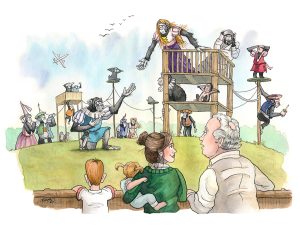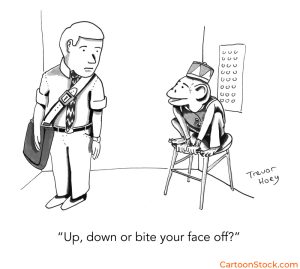
“Charmingly eccentric.” That’s what Kirkus Reviews called me in its review of my book on The New Yorker Cartoon Caption Contest, which will be released on June 4, 2024. “Wood,” Kirkus states, “has a great time here, mixing the bizarre, the jocular, and the wise into a clever package.” The book is available for pre-order here: https://us.macmillan.com/books/9781250333407
With that plug out of the way, let’s move on to this month’s CartoonStock contest, which was quite challenging. It featured a terrific drawing by New Yorker cartoonist Jack Reilly, who joined our judges’ panel to help select the winning entry and five runners-up. His drawing is set outdoors, where a family is watching a production of Romeo and Juliet that’s being performed by an all-simian cast. In the far distance a plane is flying through the air. The father is addressing his wife.
Reilly’s original caption was, “I’ve never understood Shakespeare.” A couple of you went after a similar joke:
- “His intonation lacks the nuanced inflection necessary to convey Romeo’s duality of hope and despair.”
- “The English accents are atrocious.”
There were several good sex jokes this month:
- “We should leave before Romeo starts the mating process.”
- “Be ready, their love scene is really explicit.”
- “I heard the casting couch was obliterated.”
And there were a surprising number of good puns: The best played on the homophonic terms for a group of monkeys and a group of actors:
- “Seems like ‘theater troop’ wasn’t a typo.”
- “Collectively, they’re called a troupe.”
Here are some others we liked:
- “They’re trained, just not classically.”
- “They’re really chewing the scenery.”
- “The sign says they tend to act out.”
- “Talk about high brow.”
- “No, I mean it actually literally stinks.”
That last entry would have been so much better without the word “actually,” which is completely unnecessary. In the context of the caption, “actually” is synonymous with “literally.” You wouldn’t write “literally literally,” so why write “actually literally?”
While I’m in a hypercritical mood, let me rant about the misplaced apostrophe in this entry: “I hope the actor’s strike is over soon.” That’s a good joke, but it’s undermined by the implication that only one actor refused to work. Here’s a superior and grammatically correct version of the same joke: “The actors’ strike was good for everyone.”
I thought the next entry was just OK, but my fellow judges loved it: “This is not historically accurate.”
There were a lot of scatological jokes, but here’s the best: “In this performance, the Montagues and Capulets throw feces at each other.”
There were also many references to the infinite monkey theorem, which holds that a monkey hitting random keys on a typewriter for an infinite amount of time will eventually type out the complete works of Shakespeare:
- “Sure, they can write Shakespeare, but what they really want to do is direct.”
- “I don’t care if an infinite number of them wrote it. It’s still plagiarism.”
- “I think I know what happened to our typewriter collection.”
- “Once they typed Shakespeare, they had to perform it.”
- “I dunno. Maybe if they tried some of Marlowe’s stuff.”
I like that last joke, but I don’t care for colloquialisms like “dunno.” They’re cute, and I hate cute humor. I love dark humor, though, and that’s why my favorite entry was, “This is the part where Romeo rips her arm out of its socket and eats her face.” Mankoff said that I should be ashamed of myself for highlighting that entry because monkeys have in the past viciously attacked people. Trevor Hoey came to my defense by noting that one of his cartoons, which can be purchased on the Cartoonstock website, referred to such attacks:
Jordan Peele made a similar reference in the chilling opening sequence of his most recent movie, Nope, which shows a monkey slaughtering and maiming the cast of a TV sitcom.
A couple of you compared the simians’ production of Romeo and Juliet to other theater classics:
- “Their Sondheim tribute is better.”
- “At least it’s not CATS.”
This next caption combines an acknowledgement that live theater is a refining cultural experience with a reference to the final scene from the original Planet of the Apes: “I sometimes struggle to separate signs of hope from signs of the apocalypse.”
Joel Mishon loved the way this entry addressed the airplane, focused on the actual number of monkeys in the cartoon, and implied that they can do a lot more than act: “Twenty, if you count the one who’s flying the plane.”
Here’s a fitting insult: “See? Anyone can be a theater arts major.”
And here’s a joke about those who long for the past: “Monkeys were less dramatic in my day.”
Finally, here’s a clever reference to an odd practice from Shakespeare’s time: “In the Bard’s day, men played all the roles.”
Congratulations to JOSEPH SILLS, who won the contest with, “Twenty, if you count the one who’s flying the plane.” The five runners-up are:
- “Be ready, their love scene is really explicit.”
- “In the Bard’s day, men played all the roles.”
- “Collectively, they’re called a troupe.”
- “Their Sondheim tribute is better.”
- “This is not historically accurate.”
Watch the Judging Process
If you who want to see how we made our selections, we recorded the process with Jack and its posted below
Like what you see? Subscribe to our YouTube channel for more Caption Contest episodes.


